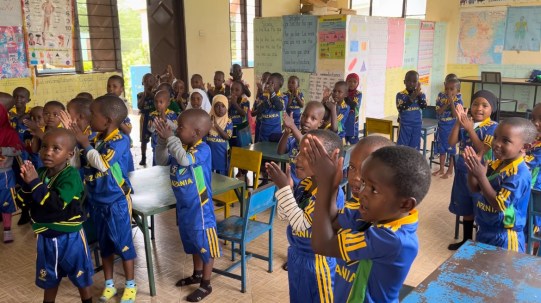Reducing stress, increasing calm
Psychotherapist and former school social worker, Erika Neil, reports on an initiative to enhance well-being among Tanzanian teachers and their students through the use of Havening techniques.
What is Havening?
Havening is a sensory technique that helps with stress reduction and mood improvement through self application. It also can be used by a Havening provider to resolve trauma. Havening uses the sense perception of soothing touch (on the hands, shoulders, and face) to generate calming brain waves, and stimulate neurotransmitters and hormones (serotonin and oxytocin). It also reduces stress hormone (cortisol) levels. It can be taught quickly and simply, and just as easily passed along to others. The technique is most effective when the mind is pre-occupied with neutral or pleasant distractions, such as singing.
Work in Tanzania
During five days in January 2024, I had the opportunity to partner with Majengo Children’s Home in Tanzania to improve mental health awareness and self-care among the children’s teachers. Out team delivered instruction on a self-help skill they could also teach students for calmness, focus, confidence, and well-being.
Mental health is currently stigmatized in Tanzania and much of Africa. This program aimed to normalize discussion of stress and well-being among teachers- with an intended goal that they would share their learning with their families and students. In total, we provided training in the modality called “Havening” to 180 teachers serving 17 schools and over 8500 students.
Teachers practiced Havening touch while singing, counting by multiples, naming months of the year, and swaying to music. Additionally, teachers applied Havening touch while reciting affirmations such as. “strong” or “I am strong” for reinforcing positive traits. All of these exercises could be used both for their self-care and in the classroom. Most of this program was experiential so that teachers could experience the calming biochemical changes themselves. The structure was light-hearted, participative, and adaptive.
We also trained teachers how to incorporate Havening into their classrooms and with individual distressed students. Teachers learned that Havening facilitates memorization, settles an activated class, and engages students for learning. It also quickly stabilizes emotional distress and provides a feeling of safety. “Havening” comes from the term “safe haven.” We directly taught 50 pre-school and kindergarten students at Majengo to do Havening touch while reciting the alphabet, counting, singing nursery rhymes, listening attentively to a book, and stating affirmations. Havening fitted into their school day easily and enjoyably. They were highly engaged through all these activities.
Impact
After the Havening workshops, self-reported well-being levels among teachers increased by 30 percent, and over 95 percent reported feeling calm. They were willing to embrace new learning about mental wellness and touch. Of the 25 regional head teachers completing an exit survey, all reported that the technique would be helpful for use for themselves and their students.
The Majengo Children’s Home provided coordination with schools, assistance and translation, posters and questionnaires, and transportation. The Majengo counselor and nurse are now following up with the schools to check on implementation and assess impact.

What we learned
Havening can promote many favorable states for adults and children including focus, confidence, listening, readiness to learn, self-esteem, safety, happiness, and performance. As a result, the technique is particularly well-suited for use in schools and this was certainly what we found in Tanzania. First indications are that this was a highly successful program that promises to have lasting benefit to the community school staff and students. Teachers reported during the week that they were using Havening at home with their families and in school with their students – especially when students were upset or off-task. Teachers had also begun incorporating it into their regular classroom routine.
The protocol of introducing the technique to teaching staff through widespread school visits in the region will serve as a model for how to bring Havening to teachers and students throughout the world, and we are looking for similar opportunities in other locations so we can continue this widely impactful project.
For more information and to contact us please visit us www.HumanitarianHavening.org.

Erika Neil, LCSW, JD is a psychotherapist and trainer who was a school social worker for 15 years. Prior to becoming a full-time therapist, Erika was a lawyer for abused and neglected children for seven years. She is the founder of Humanitarian Havening and the Havening for Educators program.
All images kindly provided by Erika.

